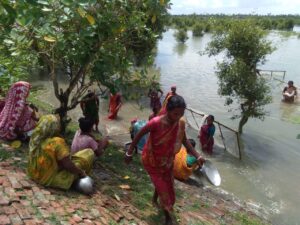

Fingerlings: Livelihood Assets for the locals of Basanti Block
Rural aquaculture as a weapon to fight poverty and reduce inequality has received renewed attention in recent years. It contributes to poverty alleviation and employs millions of people. In terms of providing nutritious food (fish being the cheapest animal protein) and creating employment opportunities, aquaculture interventions have proved to be quite useful.

Being the high resource of thousand species of fishes Sunderban rivers are full of fries and fingerlings. These fingerlings can be a source of income for the people of Sunderban for their survival if used in a controlled manner. Mukti took the initiative to encourage women to collect fingerlings and thus they will be able to earn for their families through the “Food for Work” project of Mukti.
There are two villages under Basanti Block where the program of collecting fingerlings was started by Mukti on 31st August. It was a 10 day program.
| Village Name | River Name | Number of Collected Fingerlings (Per Day) | Number of Women Working |
| Harbhanghi | Matla | 50-60 hundis | 20-25 |
| No. 6 Sonakhali | Hogol | 30-40 hundis | 10-15 |
In 400 bigha of “vheri” along with various ponds the fries and fingerlings of Parse, Bele, Payrakholi, Kat koi, Dokhina Bhetki and crabs were stored. The fingerlings were distributed to the needy people also.
Project Activities
- A village for independent and enterprising women (A VIEW) (5)
- About Mukti (4)
- Accreditation (14)
- AGM (63)
- Agriculture Reforms (124)
- Ambulance Service (2)
- Amplifying Community Voices (67)
- Awards (15)
- Awareness and Empowerment (136)
- Awareness drives (60)
- Bio-Village-Kankandighi (10)
- Careers (14)
- Chick Rearing Programme for Marginalised Women (16)
- CHILD (23)
- Climate Resilience River Embankment (46)
- Covid-19 (74)
- Cultural Shows (7)
- Cyclone Aila (13)
- Cyclone Amphan (44)
- Cyclone Bulbul (30)
- Cyclone Dana (3)
- Cyclone Remal (12)
- Cyclone Response & Recovery (90)
- Cyclone Tolerant Houses (15)
- Cyclone Yaas (57)
- Disaster Recovery (264)
- Editorial (57)
- Editorial by Abir Biswas (1)
- Editorial by Amit Kumar Dey (3)
- Editorial by Ananya Chatterjee (3)
- Editorial by Ankita Kothiyal (4)
- Editorial by Debabrata Halder (1)
- Editorial by Dr. Alokananda Ghosh Sengupta (2)
- Editorial by Kasturi Bakshi (1)
- Editorial by Monami Mitra (1)
- Editorial by Nandita (3)
- Editorial by Pampa Karmakar (1)
- Editorial by Pranay Patra (1)
- Editorial by Prof. Pradeep Ray (1)
- Editorial by Ranitendranath Tagore (1)
- Editorial by Sankar Halder (14)
- Editorial by Satyajit Ray (7)
- Editorial by Sohini Mehta (1)
- Editorial by Sonamon Basu (3)
- Editorial by Soumitra Bose (2)
- Editorial by Subhankar Basu (1)
- Editorial by Supriyo Banerjee (3)
- Editorial by Ujjwal Maity (2)
- Education and Enrichment (418)
- Environment and Resilience (127)
- Featured Activities (24)
- Gram Clinic (9)
- Health Water & Sanitation (97)
- HOPE (10)
- Impact Stories List (109)
- Integrated Development (219)
- International Management Institute (IMI) (2)
- Jal hi Kal (6)
- Kitchen Gardening (16)
- Livelihood & Enablement (220)
- MCDF (119)
- Medical Camp (45)
- MIT (8)
- MKSS (50)
- MSS (146)
- Mukti Academia (5)
- Mukti Academy (2)
- Mukti Craft (18)
- Mukti Cultural (2)
- Mukti Employment Exchange (MEE) (9)
- Mukti Fresh (15)
- Mukti Gram - Egra (11)
- Mukti Gram - Purbashridharpur (170)
- Mukti Green Defense in Sundarbans (11)
- Mukti Yoga (12)
- Mukto Dhara (2)
- Northumbria University (2)
- Obituary (6)
- Observance Days Celebration (53)
- Organic Farming & Training Support (45)
- Pond Rejuvenation (20)
- Prerana (1)
- Prerna (4)
- Projects For Mukti Wide (7)
- Queen Mary University of London (1)
- Rights and Special Needs (113)
- Run for Cause (13)
- Run4SafeFood (7)
- SDF (6)
- Shahoshini (9)
- Skill & Enterprise Development (21)
- Smart lab (5)
- Social Stock Exchange (2)
- Social Workers' Convention (1)
- Sundarbans Green (SUN-G) (15)
- Sunderban development fair project (4)
- Surya (13)
- Sustainable Agriculture Movement (63)
- SWAS-2-0 (19)
- Swastha Shongini (33)
- Swavalamban Accelerator in Sundarbans (SWAS) (21)
- Tour for Cause (45)
- TSS (198)
- UDAAN (8)
- Uncategorized (99)
- University of Calcutta (1)
- Value Education (12)
- Valued Partners (3)
- Vocational Trainings (15)
- VOICE (14)